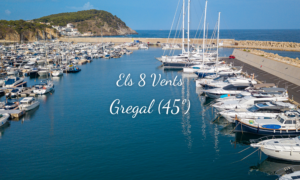Reading: 2 min
The Gregal wind is a cold and dry wind blowing from the northeast, especially known in the Mediterranean region and in particular in the Balearic Islands. Where it is considered an important wind for farmers, as the dry cold it brings helps to preserve certain crops and to limit insect pests.
Its name has a historical origin that goes back to the ancient Valencian, Catalan and Aragonese navigators who perceived it as a wind that “came from Greece”, since that is the direction in which this country is located in the Mediterranean Sea with respect to Spain.

The Gregal tends to occur more frequently in winter, and its formation is linked to low pressure systems located south of Italy and Malta. This wind can bring with it rough seas and strong waves, conditions that historically affected navigation. Moreover, it is a wind that not only impacts the Spanish coast, but is also felt in other areas of the central Mediterranean, such as Sicily and the Ionian Sea.
The etymology of Gregal therefore reflects the influence of navigation in the naming of winds in the Mediterranean, and its presence is crucial to understanding the maritime conditions of the region. In turn, it is attributed with “healing” characteristics due to its freshness.
The Gregal, when it originates as an anticyclone in the Azores, takes an oval shape and extends between the Azores and the British Isles, while in the Mediterranean it forms a squall known as “Cold Drops” or DANA. These squalls are only detected in the upper layers of the atmosphere; they disturb the wind flow, causing heavy snowfall, heavy rain and strong storms reaching up to 75km/h. Storms usually last from 3 to 5 days.
It is characterized for being cold, humid and strong; it can give rise to snowfalls or strong frosts with gusts of winds at 0ºC. The clouds that originate are not very thick, for that reason the rains are scarce, or are reduced to drizzle or light showers. When Gregal blows, the sea surface cools down, these waters, as they become denser, tend to sink, bringing to the surface warmer water that drags abundant plankton and causes the rise of fish to the surface waters. This is why it is considered a good wind for fishing, but as long as it does not bring a storm.
This wind is a great example of how the natural elements of the Mediterranean have not only influenced navigation, but also the culture, agriculture and daily life of the communities along its coast.








